Isle see you there - Europe
With over 120 permanently inhabited islands surrounding the United Kingdom, you don’t need to travel far to enjoy peace and isolation, says Imogen Lepere
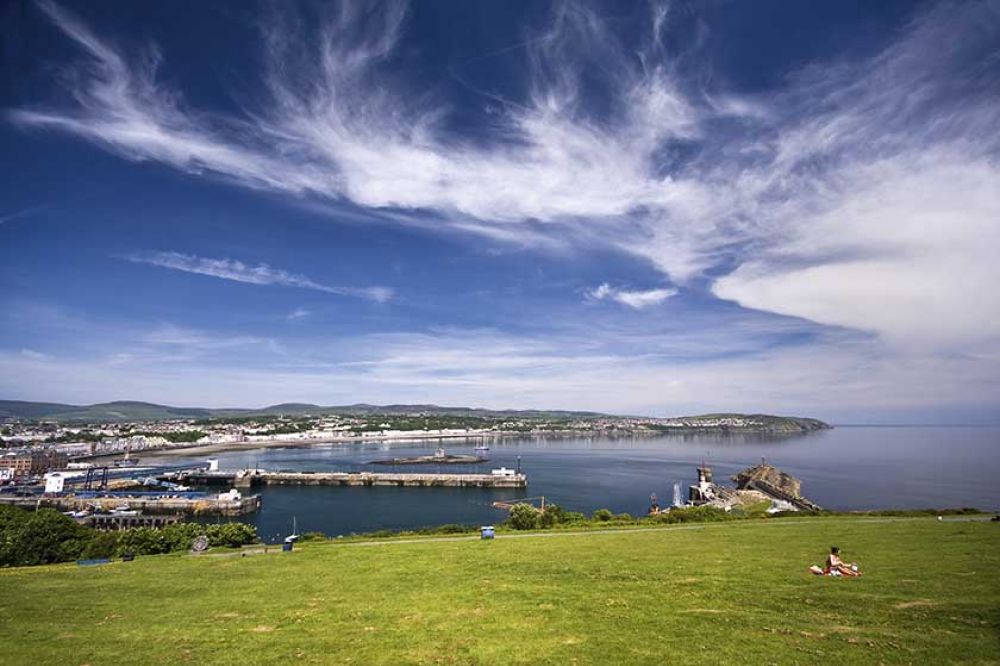
With over 120 permanently inhabited islands surrounding the United Kingdom, you don’t need to travel far to enjoy peace and isolation, says Imogen Lepere
This tiny fleck of green floating between England and France may have an area of just 5.45sq km but it is, in fact, an independent state. The Channel Islands are the last remnants of the Duchy of Normandy, which was wrestled away from Anglo-Norman control by the French in 1204. The local government, known as the Chief Pleas, rule with a system that can be traced back to Norman times. Many of the islanders are descendants of the original English settlers and older residents still speak Sercquiais, a dialect descended from Norman French.
Sark basks in a self-imposed time warp. Its pretty lanes and
single main road are entirely car-free. Instead, horse-drawn
carts will heave your bags from the harbour to The Village (the
only one on the island), where inviting whitewashed cottages
await. The only way to get around is on foot or by bike, so sort a
ride from Avenue Cycle Hire and head for the coast. The narrow
isthmus which connects Sark to Little Sark delivers glorious sea
views, while woodland paths wind their way to farmhouses
selling fresh cream from the native Guernsey cows.
Streetlamps are too newfangled for Sark. In fact, it has so little light pollution it officially became a Dark Sky Community in 2011. Gaze upwards on a summer’s evening and you’ll be able to see the white smudge of the Milky Way itself.
With such utter isolation, it’s no surprise that locals are a convivial lot. In summer there are a host of quirky festivals. Act fast to bag tickets to the Sark Folk Festival (30 June-2 July), eat your way around the street market (25 June) and place your bets on which sprightly animal will be the victor of the fiercely contested sheep-racing weekend (21-23 July).
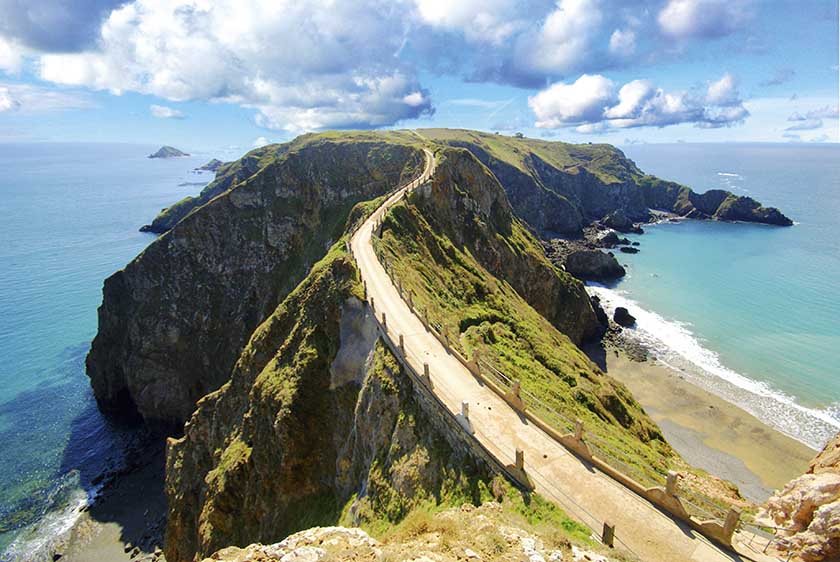
WHERE TO STAY
La Sablonnerie is the island’s grand dame hotel
in a 400-year-old farmhouse. Expect nostalgic prints, faded rugs
and a restaurant specialising in lobster. Doubles from £237,
including a five-course dinner for two. sablonneriesark.com
HOW TO GET THERE
Condor Ferries condorferries.co.uk has regular departures from Portsmouth to Guernsey, from £69 return with car. The Sark Shipping Company has several boats a day from Guernsey from £29 return. sarkshippingcompany.com
The Inner Hebrides is a wild, rugged group of islands off the west coast of Scotland. At its southernmost point, the Isle of Islay is a windswept, magnificent destination. Its glassy lochs are full of wild salmon and swathes of sand dot its 210km coastline, but the real draw card is the peaty soil which is perfect for whisky production.
Despite the fact it has fewer than 3,500 residents, its 11 distilleries
produce some of the world’s finest single malts. Names such as
Laphroaig and Bruichladdich sound like Celtic heroes and the
whiskies they produce are equally powerful, famed for big, smoky
flavours. Learn about the skills of distilling during Bowmore’s
Craftsman’s Tour, follow Loch Uigeadail, Ardbeg Distillery’s
water source, on a guided hike or enjoy a wee dram in the island’s
many pubs. An Tigh Seinnse in Portnahaven and Ballygrant Inn in Ballygrant are atmospheric watering holes and you can be sure
the locals will have an opinion on which whisky you should order.
While we can’t guarantee sunshine, the white-sand beaches
and turquoise water wouldn’t look out of place in the Caribbean.
Killinallan Point has the finest powder, Saligo Bay enjoys
dramatic sunsets, while sheltered Sanaigmore Bay is an idyllic place to spend a summer’s afternoon.
For somewhere even more remote, the Isle of Jura is a ten-minute boat hop across the Sound of Islay. Wild and unspoilt, it is home to just 200 people and 6,000 red deer. It was here that George Orwell retired to write Nineteen Eighty-Four, although this masterpiece could have been lost when, in 1947, he nearly drowned in the notorious Corryvreckan whirlpool.
Bridgend Hotel’s genteel dining room is comfortingly nostalgic, with snowy napkins folded into rings and heavy red curtains. The chefs work closely with local producers and Islay Estates venison, oysters from Loch Gruinart and vegetables grown in the Islay House Community Garden provide a taste of local life.
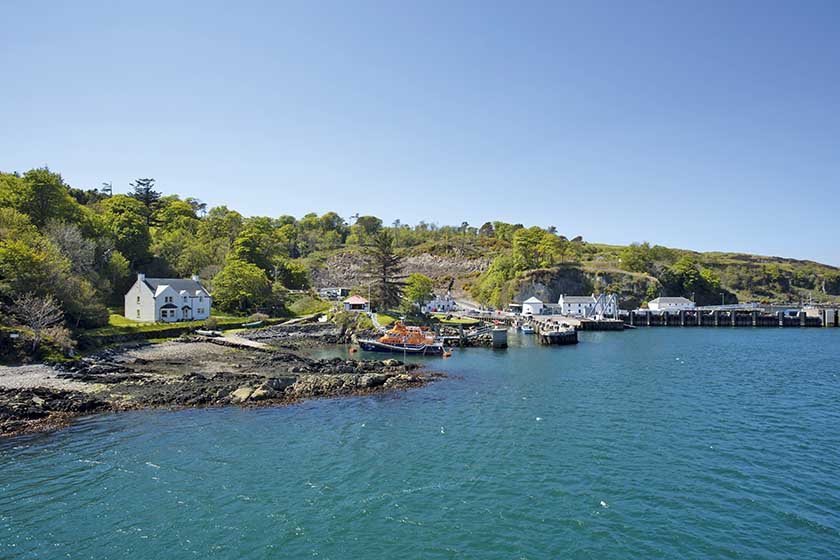
WHERE TO STAY
The Islay Hotel overlooks the marina in Port Ellen.
Its 13 bedrooms are roomy and comfortable, with local tartan rugs
on the beds to remind you where you are and jugs of fresh flowers on
the windowsills. Doubles from £190. theislayhotel.com
HOW TO GET THERE
Loganair has two flights a day from Glasgow Airport to Islay Airport from £95 return. loganair.co.uk
Most people know two things about the Isle of Man. The first is that it is home to a species of tailless cat, the result of a genetic mutation. The second is that in May and June the Tourist Trophy motorbike race draws 50,000 petrolheads to its emerald shores.
It’s ironic that the Isle of Man has a reputation for speed because for 50 weeks a year, it’s a slow-moving place. Halfway between England and Ireland, it is home to the world’s oldest continuous parliament, the Tynwald, established by the Vikings in 979AD. Until the 20th century, Manx Gaelic was the chief language, with the last native speaker only passing in 1974.
Last year, Unesco declared the island a Biosphere Reserve (one of six in the UK), marking it out as one of the most beautiful spots in Britain to immerse yourself in nature. Of its 572sq km, 40 per cent is uninhabited. Expect deserted glens, rugged coastlines pounded by the Irish Sea and misty valleys.
This epic landscape lends itself to adventure. Paddle around the oddly shaped Sugarloaf Rock on a sea kayak with Adventurous Experiences, take to the lonely moors for a lesson with Manx Paragliding or follow a disused railway deep into Glenn Mooar.
For all that it is a pastoral idyll, the Isle of Man is also a tax haven, and its wealth is evident in the amount of artisan foods available. Moore’s smokehouse cures creamy textured kippers, a flurry of microbreweries have opened in recent years, while farmers’ markets such as Castletown and Ramsey overflow with organic produce. 14North on Douglas’s harbour treats local ingredients with the respect they deserve. Its menu regularly features crayfish, queenie scallops and native Loaghtan mutton. This meat is highly prized on the island but it’s also difficult to track down as Harrods does its best to snaffle the lot.
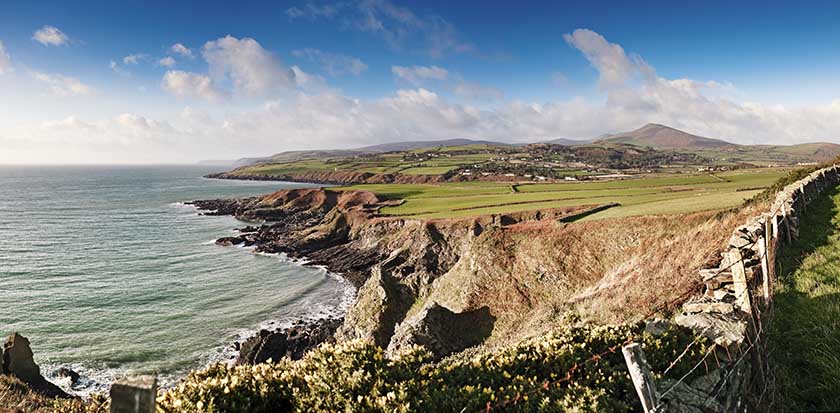
WHERE TO STAY
Acacia Boutique enjoys a prime location on Douglas’s Queens Promenade. Its 12 bedrooms are spacious, while the Acacia Suite boasts a roof terrace that’s idea for soaking up the view. Doubles from £95. acaciaboutique.co.uk
HOW TO GET THERE
easyJet has flights from various London airports to Isle of Man Airport from £48 return. easyjet.com
Formed from some of the oldest rocks in the UK, this epic island off the north-west coast of Wales is steeped in history and intrigue. Its past is a storybook filled with saints, princes (William), princesses (Kate), pioneers and more recently stand-out comedians; Dawn French is its most famous daughter.
Until a bloody massacre by the Roman army in 60AD, it was the last stronghold of the Celtic druids and they’ve left their mark all over the island. From the Bodewryd Standing Stone to the Tŷ Newydd Burial Chamber, its fertile pastures hint at ancient mysteries, adding interest to country walks.
If more recent history is your thing, 150 recognised monuments scattered throughout Anglesey’s 714sq km make for fantastic days out. Beaumaris Castle is considered by some as the most architecturally perfect in Britain, Amlwch was one of the biggest copper mines in the world and fortified much of Nelson’s fleet at Trafalgar, while the ruins of St Dwynwen’s Church is one of the most romantic spots in the UK. Built on the tidal island Ynys Llanddwyn, just beyond the village of Newborough, it is named after a 5th-century princess who became the Welsh patron saint of lovers following a nasty spell of heartbreak. The Blue Flag beach has views over the Menai Strait and peaks of Snowdonia, and is backed by a protected forest where red squirrels and ravens can be spotted marauding in the countryside.
You’ll need to book weeks ahead to bag a table at Sosban & the Old Butchers at Menai Bridge. Although its opening hours are as limited as a village shop (Thursday, Friday and Saturday evenings and Saturday lunch) and it has just 16 covers, it was awarded a Michelin star in 2016. There is a single set menu available daily.
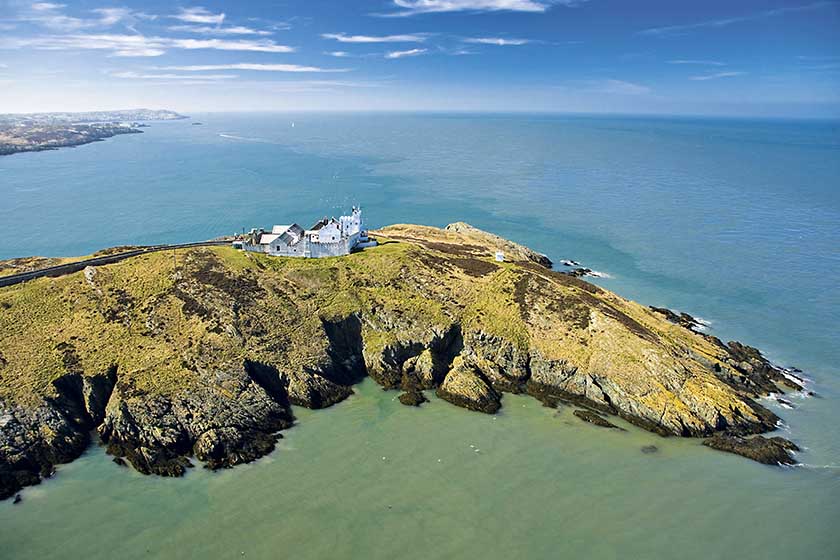
WHERE TO STAY
The Bull in Beaumaris is a quaint, seaside coaching inn that counts Charles Dickens among its former guests. Expect original beams and brightly patterned wallpaper. Doubles from £90. bullsheadinn.co.uk
HOW TO GET THERE
Virgin has direct services from London Euston to Holyhead on Anglesey from £88 return. Typical travel time is under four hours. virgintrains.co.uk
The next stop after Lundy is America. This granite outcrop soars 120m above the Bristol Channel and measures just 4.45sq km. Despite its minuscule size, people have always fought to own Lundy. Its appeal is timeless. Pillaging Vikings gave it its name (lundi ey in Old Norse means ‘puffin island’), the Barbary pirates evaded the law by hiding in its secret bays and the most recent private owners, the Harmans, unwillingly sold it in 1968 with the proviso that ‘whoever takes over Lundy must love it as we do’.
Just 28 hardy souls call it home, yet its 23 rental properties tell the story of 3,000 years of human habitation. There’s a 13th-century castle, three lighthouses (only two are operating today), a Georgian villa, fisherman’s chalet and isolated Tibbetts cottage, the coastguard’s lookout. We love The Old School, a snug hideaway painted vibrant India blue with a cosy sloping ceiling and panoramic views across the bay and out to sea.
The hum of cars is foreign to Lundy. The only noises that break the silence are the sound of the gulls and the Atlantic waves on the cliffs. These have been the downfall of many sailors – more than 200 vessels have foundered there, including the Royal Navy battleship HMS Montagu in 1906, and their wrecks remain atmospheric diving spots. Sunfish occasionally glide through its kelp forests and leatherback turtles have been known to hitch a ride on the sweeping currents of the Gulf Stream.
Another unconventional attraction is the Lundy Letterboxes. The island has its own private postal service, funded by its own puffin stamps. There are 27 letterboxes hidden all over the island and ‘letterboxing’ (trying to track them all down) is a great way to explore. The village shop supplies clue sheets.
Martin Coles Harman, a previous owner of the island, was a keen naturalist and introduced sika deer and Soay sheep which graze the hills. Both are a feature on the menu at the Marisco Tavern, an appealing watering hole that never shuts.
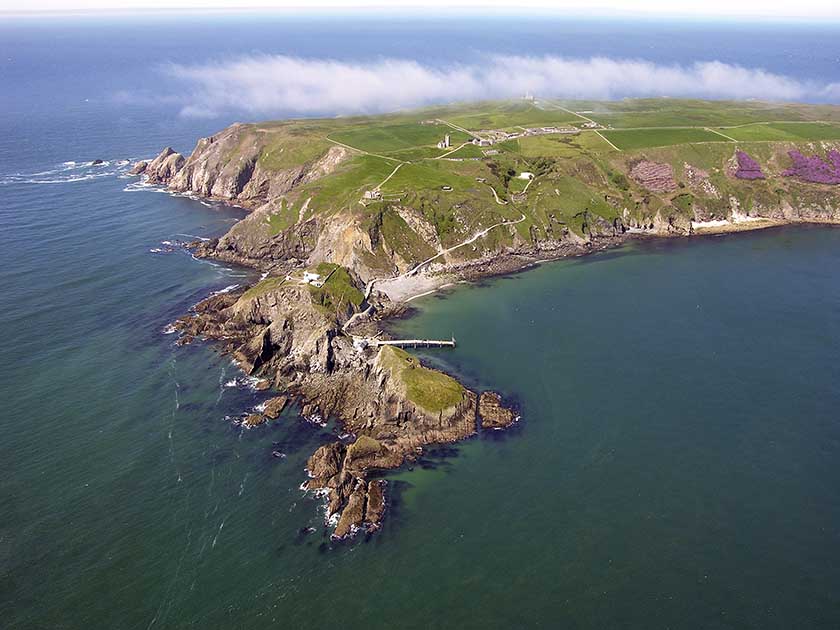
WHERE TO STAY
Choose from one of the 23 private rental
properties. All except Tibbetts have electricity. From £108 per
night for the Radio Room. lundyisland.co.uk
HOW TO GET THERE
From March to October, the MS Oldenburg sails three times a week from Bideford or Ilfracombe. Day return £37; period return £65. 01271 863 636, lundyisland.co.uk
This tiny island is officially the most remote place you can live in the UK. A two-hour boat journey from Shetland, many describe it as the last real British wilderness. Despite the fact it is only 4.8km long and 2.4km wide, the cliffs on its western shore rise 200m above the crashing sea, while inlets such as Stroms Hellier are so treacherous, an Armada ship was wrecked there in 1588.
There may be no electricity at night, limited phone reception and only one shop but adventurous types are queuing up to live here. However, with a permanent population of 60, there are currently no spare houses. This could in part be due to the fact that rent is typically £500 per year. The real draw here, though, is the sense of timelessness. The island has been inhabited since the Bronze Age and ancient customs such as the hill caa (the communal gathering and shearing of the hill sheep) are still alive.
If you’re looking to escape modern life, you can’t beat a holiday on Fair Isle. Start your day with a free guided walk with Bird Observatory wardens, helping them record and monitor the fulmars, teals, gannets, terns and puffins that call this coast their home. Explore the dramatic coastal paths on the north of the island while spotting grey seals, swim in the large tidal rock pool near the lighthouse or learn to spin a traditional Fair Isle jumper at Kathy Coull’s textile workshop. The island has its own dialect, which you can brush up on with the help of a local dictionary from the shop. However, you’ll only become familiar with words from A to P, because the second notebook containing Q to Z was lost in an attic clear out.
The food reflects the islanders’ traditional lifestyle and is all grown organically on local crofts, foraged from the lush countryside or plucked from the icy Atlantic. Call ahead to let the Bird Observatory’s restaurant know you’re coming and join the wardens for a delicious meal. The island’s band, mostly from the same family, often play there in the evenings.
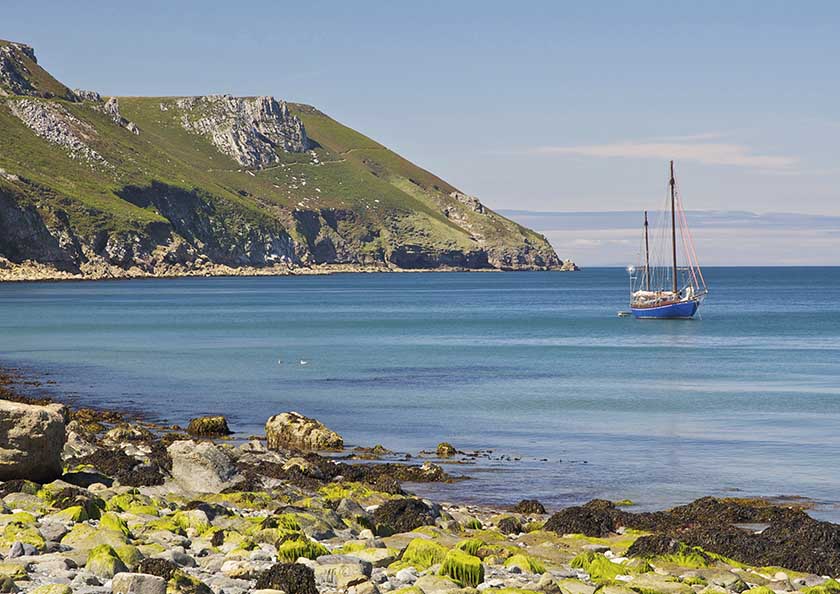
WHERE TO STAY
South Lighthouse is a charming guesthouse in
the old lighthouse-keeper’s cottage with breathtaking views.
Doubles from £120 including meals. southlightfairisle.co.uk
HOW TO GET THERE
British Airways britishairways.com has daily flights from London to Shetland via Aberdeen from £386 return. Airtask has two flights a day in summer (no service on Sunday) from Lerwick to Fair Isle from £84. airtask.com
Life on Rathlin hasn’t been easy. Despite its small size (it’s a reverse ‘L’ shape, 6km across, 4km north to south), its location between Scotland and Ireland made it a focus for feuds. Robert the Bruce took refuge here from 1306-07 after being defeated by the English near Perth. In 1575, its 600 inhabitants were massacred, lead by Sir Francis Drake, and when the population finally rose back to 1,000 people, half emigrated in 1846 to flee famine. However, for the first time in two centuries, the community has grown to 150 people and it’s on the rise. New houses are being built and the Georgian manor house, once home to eccentric aristocrats, has just reopened as a luxury hotel.
The island’s calling card is that it is home to one of the biggest colonies of seabirds in Europe. Visit the Rathlin West Light Seabird Centre in July and you’ll see tens of thousands of puffins, razorbills, guillemots and kittiwakes with chicks jostling for space on the salty cliffs. RSPB staff are on hand with binoculars to help you interpret the birds’ behaviour and point you in the direction of the nature reserve at Roonivoolin.
The beauty of the landscape is unsurpassed. Follow any of the eight waymarked walking trails on the island and you’ll discover fields divided by dry-stone walls, rolling whin (the local name for gorse) heath in which you might catch a glimpse of the rare Rathlin golden hare and dramatic cliffs with views over the Mull of Kintyre. Hire a bike from Soerneog View Hostel to discover standing stones erected 5,000 years ago and the marks on cave walls where Neolithic warriors hewed axe heads out of the rock.
From 9-16 July the Festival Week brings plenty of ceol agus craic (music and fun) to Rathlin village, with model-yacht racing in Church Bay, ceilidhs and storytelling. Order a pint of Rathlin Red ale (4.8% ABV) at the traditional McCuaig’s Bar and be swept along with the party atmosphere that runs into the night.
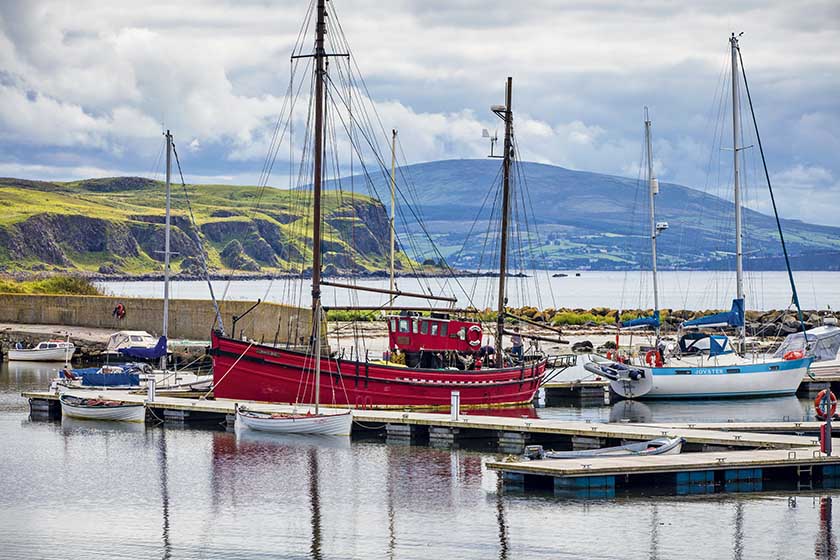
WHERE TO STAY
The Manor House has beautiful views over Church Bay and 11 stylish bedrooms decorated in restful marine hues. Its Island Restaurant serves the best shellfish on Rathlin. Doubles from £95. manorhouserathlin.com
HOW TO GET THERE
Ryanair ryanair.com has daily flights from London Gatwick to Belfast from £26 return. The Rathlin Ferry has ten sailings a day from Ballycastle to the island from £12 return. rathlinballycastleferry.com
The most accessible island on our list, Mersea is reached by an ancient causeway which floods at high tide. Its situation in the Blackwater and Colne estuaries to the south of Colchester in Essex makes it a natural habitat for shellfish. Oysters and Mersea go together like bread and butter, although shrimp, brown crab and lobster are all in plentiful supply. Mersea native oysters are among the most prized in the UK, renowned for their plump silkiness, and some of the oyster beds in the Colne were awarded to the local authority by Richard the Lionheart in 1189. Even the local football team is named Oyster FC.
The Haward family has been cultivating and harvesting oysters from the Blackwater estuary since the 1700s. You can taste their catch at their family restaurant, The Company Shed, which is on the water in West Mersea. Bring your own wine (although local wine and beer is on sale) and slurp natives when they’re in season (September-April) and rock oysters the rest of the year. You can also take a 20-minute journey with Lady Grace Boat Trips round Packing Shed Island, where oysters were sorted until the 1950s.
It may only be 18sq km but Mersea’s two villages and their surrounding areas have very different atmospheres. West Mersea is the island’s capital and will remind you of childhood trips to the seaside. The Victoria Esplanade is lined with candy coloured beach huts, the water off Monkey Beach makes for lovely swimming and you can catch whopping crabs off the causeway. The yacht club is the centre of the island’s social life.
East Mersea is little more than a hamlet and its surrounds feels much more wild. Cudmore Grove’s wildflower meadows are home to 15 species of butterfly in summer and make for great walking. Be sure to pick up a few bottles at Mersea Island Vineyard. Mersea Mehala is a dry white bursting with elderflower aromas which make it a great pairing for the local fish. The adjacent microbrewery serves a traditional stout, the Island Oyster, made with malt and oysters.

WHERE TO STAY
Monkey Beach Cottage is a romantic 300-year- old building with a red-tile roof and vines twisting around the front door. There are even views over the estuary. From £600 per week. Sleeps up to seven. monkeybeachcottage.co.uk
HOW TO GET THERE
Greater Anglia greateranglia.co.uk has several trains an hour from London Liverpool Street to Colchester from £20 return. The 67 bus runs from Colchester High Street to West Mersea from £6 return. bustimes.org.uk
Subscribe and view full print editions online... Subscribe